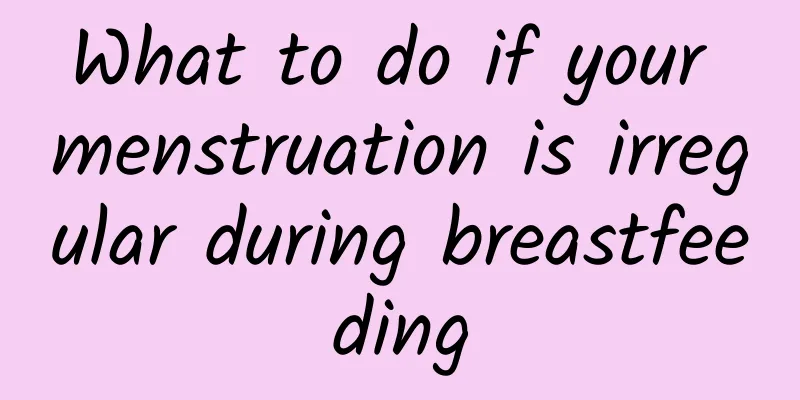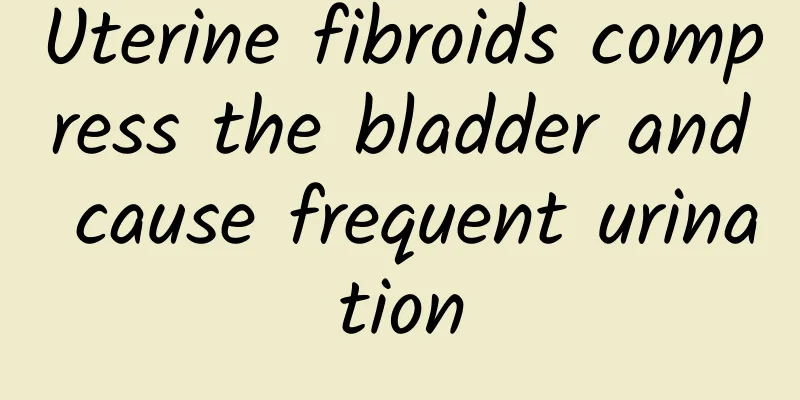What to do if your menstruation is irregular during breastfeeding

|
What should I do if I have irregular menstruation during breastfeeding? Irregular menstruation during lactation may be caused by physiological factors, or pathological factors such as malnutrition and anemia. It is recommended to seek medical attention in time and take medication according to the doctor's advice. 1. Physiological reasons: It is related to the hormones in the patient's body. Since the level of prolactin increases during lactation, high prolactin will inhibit ovulation and may cause irregular menstruation during lactation. If the irregular menstruation is caused by breastfeeding in a short period of time, no special treatment is generally required. After stopping breastfeeding, or after the hypothalamus-pituitary-gonadal axis has adapted for a period of time, ovulation will resume and menstruation will return to normal. 2. Malnutrition: If you do not eat some high-nutrition foods during breastfeeding, you will experience malnutrition, thin or less milk, weak constitution, irregular menstruation, etc. The nutrients needed by the body during breastfeeding will be higher than usual, so malnutrition is more likely to occur. In daily life, you should supplement more protein, eat more eggs, fish, lean meat, etc. 3. Anemia: It is related to the patient's daily living habits. If you do not pay attention to your diet for a long time and are picky about certain foods, it may lead to anemia during lactation. It may also be caused by excessive nutrient loss during pregnancy and childbirth. If you have anemia during lactation, the patient may also experience menstrual abnormalities. You can adjust your diet or take medications appropriately. For example, foods such as red dates, spinach, and animal livers have high iron content and can relieve anemia symptoms. You can also use ferrous sulfate tablets, ferrous succinate tablets and other medications under the guidance of a doctor. In addition to the above reasons, it may also be cervicitis, endometritis, premature ovarian failure, etc. It is recommended to seek medical attention in time and treat the cause after finding out the cause. |
<<: One deep and one shallow is a sign of menstruation
>>: What to do if dysmenorrhea is caused by uterine fibroids
Recommend
What causes uterine fibroids? How to treat uterine fibroids
Expert introduction: Uterine fibroids are directl...
Does your annual fitness plan always fall through? 4 tips to help maintain
It’s time to make new wishes for the New Year. Go...
Can I have sex after cervical erosion surgery? What should I pay attention to after cervical erosion surgery?
For women in need, it is not enough to understand...
When does menopause usually occur?
Menopause is a stage that everyone must go throug...
Experts briefly analyze common methods of preventing ectopic pregnancy
As a gynecological disease that seriously endange...
During the epidemic, the three highs and weight are out of control! Do Tabata exercise, choose low GI, and eat rainbow bento
After two months of staying at home at level 3 al...
The main reasons for female dysmenorrhea leading to infertility are
Women who suffer from dysmenorrhea are not only i...
What are the symptoms of ectopic pregnancy mass disappearance?
What are the symptoms of disappearance of ectopic...
Are multiple ovarian cysts serious?
I believe all women know the significance of ovar...
The causes of cervical erosion are mainly divided into the following categories
Cervical erosion is the most common disease among...
Does uterine cold and pelvic inflammatory disease affect pregnancy?
Uterine cold and pelvic inflammatory disease may ...
Why is the menstrual flow so light?
Light menstrual flow can be confusing and worryin...
A big female nutritionist lost 8 kg by fasting
Want to lose weight without losing breasts? It is...
What are the tests for uterine fibroids?
There are many types of uterine fibroids, and the...
What is the most effective treatment for congenital absence of vagina?
People are not particularly familiar with the sym...









